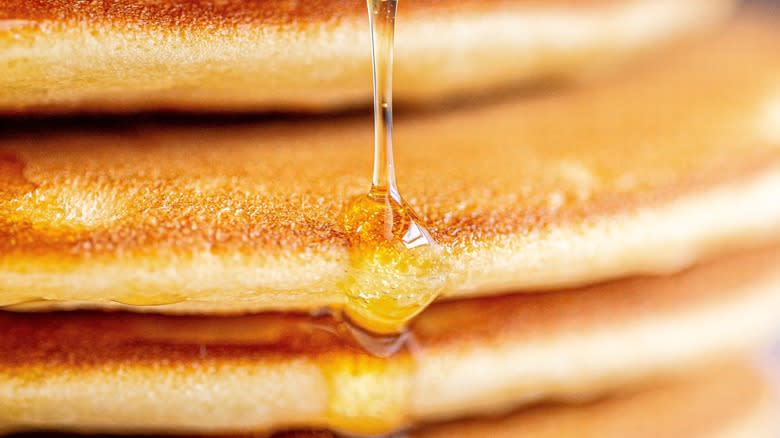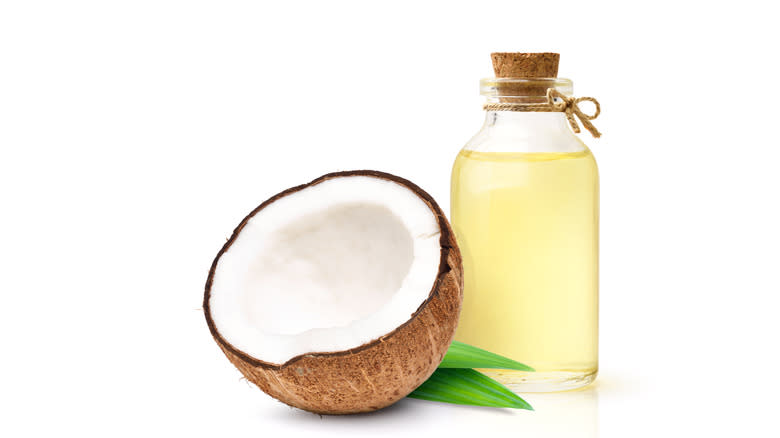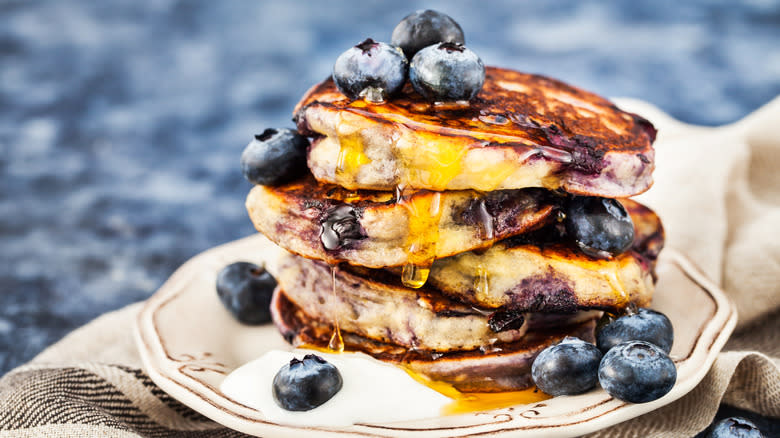It's Time You Start Making Pancakes With Coconut Oil

Coconut oil's heyday of being touted as the ultimate healthy fat may be over, but that doesn't mean that it doesn't still have its share of benefits or ideal uses. While it is high in saturated fat, as with anything, moderation is key, and regardless of where scientists and nutritionists ultimately land on its healthiness, this is a tasty oil. The unrefined version has a natural coconutty profile that complements a variety of foods, while the refined version is more neutral but still carries a hint of the original aroma. Refined coconut oil also has a fairly high smoke point of 400 degrees Fahrenheit, making it perfect for those who like to use a higher heat with their classic morning pancakes.
Since the pan (or griddle) needs to be hot enough to cook the pancakes all the way through, an oil with a decent smoke point is your best bet. Higher heat also guarantees those perfect crispy edges that so many people love. However, if you prefer pancakes with soft edges you can turn the heat down a bit, but you'll probably want to make them a little thinner to ensure that the centers still come out fluffy and not gooey. Unrefined coconut oil has a much lower smoke point, similar to extra virgin olive oil, so you'll need to use it at a lower temperature than refined; one big benefit to using the unrefined stuff is that it will impart a light but noticeable coconut flavor.
Read more: The 15 Best Milk Brands, Ranked
Why Coconut Oil Beats Other Fats

If you've ever fried your pancakes in coconut oil before, then you already know it can't be beaten. Butter tries — it does add its own rich flavor after all. Ultimately though, butter's water content evaporates and its milk proteins start to fall apart under the pressure of high heat. As a pure fat, coconut oil doesn't have these issues. While even unrefined coconut oil can take temperatures up to 350 degrees Fahrenheit, butter can start to become compromised at the 300 mark. Unlike butter, coconut oil is also perfect for vegetarian and vegan pancakes.
Vegetable oils (such as canola) are also good for frying pancakes while avoiding animal products, and they can also take higher heat than butter. But, let's be honest, when it comes to sweet breakfast foods, their neutral flavors are kind of boring. So while vegetable oils technically work perfectly fine, they're also nothing to write home about. With simple fare like pancakes, it's the little things that can make a big difference. Why not choose the best oil possible?
Flavored Pancakes Are Where Coconut Oil Really Shines

Coconut oil pairs perfectly with a variety of flavored pancakes, whether you use the refined or unrefined version. Blueberry pancakes are remarkably good with a hint of coconut flavor or aroma, and since they cook better at a slightly lower heat than plain pancakes, they're a great opportunity to give the unrefined oil a try. Peanut butter pancakes also go very nicely with coconut oil, as do chocolate chip and pumpkin-flavored ones. You'd actually be hard-pressed to think of a type of pancake that isn't enhanced by being fried in coconut oil.
Adding buttermilk to pancakes helps to make them thick and fluffy, and definitely give coconut oil a try there too! The buttermilk will result in restaurant-quality pancakes while the coconut oil will ensure they come out a beautiful golden brown. You'll also get an extra note of something special in the flavor without any burnt milk proteins from butter that got too hot.
Read the original article on Daily Meal.

